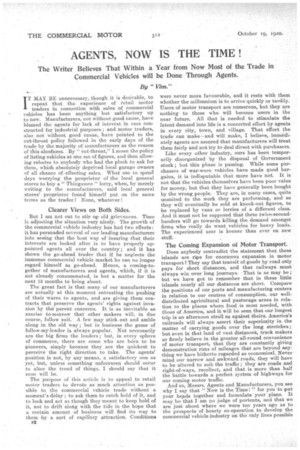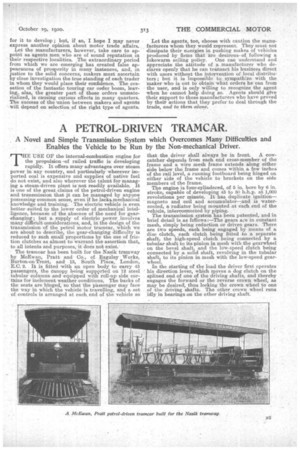• AGENTS, NOW IS THE TIME!
Page 10

Page 11

If you've noticed an error in this article please click here to report it so we can fix it.
The Writer Believes That Within a Year from Now Most of the Trade in Commercial Vehicles will be Done Through Agents.
By " Vim:"
IT MAY BE unnecessary, though it is desirable, to repeat that the experience of retail motor traders in connection with sales of commercial vehicles has been anything but satisfactory up to now. Manufacturers, not without good cause, have blamed the agents for lack of interest in cars constructed for industrial purposes ; and motor traders, also not without good cause, have pointed to the cut-throat policy followed in the early days of the trade by the majority of manufacturers as the reason of this aloofness. By " cut-throat," I mean the policy of listing vehicles at one set of figures, and then allowing rebates to anybody who had the pluck to ask for them, which absolutely deprived local garage owners of all chance of-effecting sales. What use to spend days worrying the proprietor of the local general stores to buy a" Thingumee " lorry, when, by merely writing to the manufacturers, said local general stores' proprietor found himself put on the same terms as the trader ? None, whatever !
Clearer Views on Both Sides.
But I am not out to stir up old grievances. Time is adjusting the situation very nicely. The growth of the commercial vehicle industry has had two effects : it has persuaded several of our leading manufacturers into seeing that the best way of insuring that their interests are looked after is to have properly appointed agents all over the country; and it has shown the go-ahead trader that if he neglects the immense commercial vehicle market he can no longer regard himself as go-ahead. Hence, a coming-together of manufacturers and agents, which, if it is not already consummated, isbut a matter for the next 12 months to bring about.
The great fact is that many of our -manufacturers are actually at this moment entrusting the pushing of their wares to agents, and are giving them contracts that preserve the agents' rights against invasion by the' parent concerns. It is as inevitable as sunrise to-morrow that other makers will, in due course, follow suit. A few may stick. out and amble along in the old way ; but in business the game of follow-my-leader is always popular. Not necessarily are the big firms the leaders ; but, in every sphere of commerce, there are some who are bOrn to be pioneers, simply because they are the quickest to perceive the right direction to take. The agents' position is not,. by any means, a satisfactory one as yet, but, unless something unforeseen should occur to alter the trend of things, I should say that it soon will be.
The purpose of this article is to appeal to retail motor traders to devote as much attention as possible to the commercial vehicle trade without a moment's delay ; to ask them to catch hold of it, and to look and act as though they-meant to keep hold of it, not to drift aloeig with the tide in the hope that a certain amount of business will find its way to them by a Bert of capillary attraction. Conditions F2 were never more favourable, and it rests with them whether the millennium is to arrive quickly or tardily. Users of motor transport are numerous, but they are nothing to those who will became. users in the near future. All that is needed to stimulate the latent demand into life is a concerted effort by agents in every city, town, and village. That effort the trade can make—and will make, I believe, immediately agents are assured that manufacturers will treat them fairly and not try to deal direct with purchasers.
Like every other industry, ours has been temporarily disorganized by the disposal of Government stock ; but this phase is passing. While some purchasers of war-worn vehicles have made good bargains, it is indisputable that more have not. It is not that the vehicles themselves have been poor value for money, but that they have generally been bought by the wrong people. They are, in many cases, quite unsuited to the work they are performing, and so they will eventually be sold at knock-out figures, to be replaced by vans or lorries of a different class. And it must not be supposed that thee twice-secondhanders will go towards killing the demand amongst firms who really do want vehicles for heavy loads. The experienced user is keener than ever on new stuff.
The Coming Expansion of Motor Transport.
Does anybody contradict the statement that these islands are ripe for enormous expansion in motor transport? They say that transit of goods by road only pays for short distances, and that railways must always win over long journeys. That is as may be ; but we have got to remember that in these little islands nearly all our distances are short. Compare the positions of our ports and manufacturing centres in relation to our centres of consumption, our welldistributed agricultural and pasturage areas in relation to the places where food is most needed, with those of America, and it will be seen that our longest trip is an afternoon stroll as against theirs. America's railroads will always assert their superiority in the matter of carrying goods over the long stretches ; but even in that land of vast distances, truck makers so firmly believe in the greater all-round convenience of motor transport, that they are constantly giving demonstration runs of mileages that are beyond anything we have hitherto regarded as economical. Never mind our narrow and awkward roads, they will havc to be altered to suit the traffic; they are roads and right-of-ways, recollect, and that is more than half the battle towards a perfect system .of highways for our coming motor traffic. And so, Messrs. Agents and Manufacturers, you see why I say that "Now is the Time ! " for you to put your he.a.ds together and formulate your plans. It may be that I am no judge of portents, and that we are just about where we were ten years ago as to the prospects of hearty co-operation to develop the commercial vehicle industry on the only lines possible for it to develop ; but, if so, I hope I may never express another opinion about motor trade affairs.
Let the manufacturers, however, take care to appoint as agents men who are of sound reputation in their respective localities. The extraordinary period from which we are emerging has created false appearances of prosperity in many instances, and, in justice to the solid concerns, makers must ascertain by close investigation the true standing of each trader in whom they would place their confidence. The cessation of the fantastic touring car order boom, leaving, alas, the greater part of those orders unmaterialized, is causing curious effects in many quarters. The success of the 'union between makers and agents will depend on selection of the right type of agents. Let the agents, too, choose with caution the manufacturers whom they would represent. They must not dissipate their energies in pushing makes of vehicles produced by firms that are desirousof following a lukewarm selling policy. One can understand and appreciate the attitude of a manufacturer who declare openly that he can transact his business direct with users without the intervention of local distributers; but it is impossible to sympathize with the maker who is out to obtain what orders he can from the user, and is only willing to recognize the agent when he cannot help doing so. Agents should give their support to those manufacturers who have proved by their actions that they prefer to deal through the trade, and to them •ctione.












































































